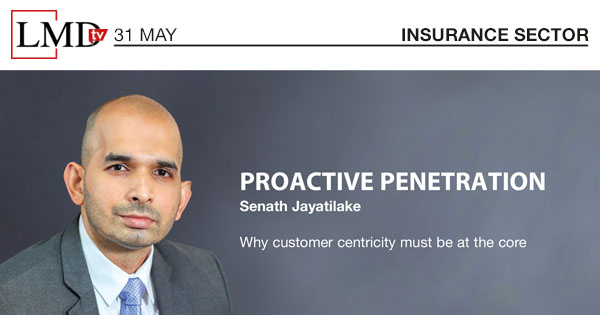Sri Lanka’s insurance penetration rate is among the lowest in the region. Yet, the sector is experiencing growth against the backdrop of economic uncertainty, according to the Deputy Chief Executive Officer of Union Assurance Senath Jayatilake.
“We have observed penetration rates increasing at a consistent rate, although it is not close to any benchmark,” he noted, on a recent edition of LMDtv.
He explained: “What’s happened over the last two years when it comes to the macroeconomic constraints faced by this country and society has been a catalyst that creates the need for insurance.”
Jayatilake believes that innovation will help insurers stay ahead of the competition.
He elaborated: “If we look back over the last two and a half years, the reason for the insurance sector performing as it did and managing to stay afloat was because it innovated across the value chain; from product innovation to how we reached customers – and interacted with them, and our own staff and sales teams.”
“The entire ecosystem underwent a rigorous process of innovation because the fundamentals of how insurance is sold and bought were challenged during these couple of years,” Jayatilake observed, adding: “That led to innovation and this phase is continuing.”
Another innovation he highlighted was the switch from traditional face-to-face interaction-based insurance sales techniques to the use of digital tools and technology, to reach out to and interact with customers.
According to the Deputy Chief Executive Officer of Union Assurance, the need for innovation in this under-penetrated sector is to ensure integration of insurance with customers’ needs as much as possible: “You need to be deeply rooted and integrated with the evolving needs of customers – as well as the evolving realities of the market.”
“You need to be customer-centric, market-centric and proactive in your innovation, which is absolutely important if we are to stay ahead,” he emphasised.
Jayatilake underscored that in an under-penetrated market, “there’s an onus on insurance companies to develop the right products and needs while having customer centricity at the core.”
He pointed out that customer centricity has always been a part of the insurance sector’s operating model: “It becomes ever more important to be deeply involved and customer-centric in a rapidly evolving market situation.”
“Uncertainty in a market also means that customer needs, desires and realities keep evolving. Therefore, the strength of your integration with the customer – your customer-centricity – becomes much more important,” he added.
In addition, Jayatilake asserted that “companies need to invest a great deal in engaging with their customers, connecting with them, and being part and parcel of the evolution of their needs and realities.”
“We are in the business of protecting lifestyles and households,” he noted, elaborating that “therefore, the needs of customers will always be pivotal to our innovation process.”
And given the role of insurance companies, Jayatilake believes that “there’s an onus on us to ensure that we proactively bring in solutions to customers based on the evolution of their needs.”
He shared another motivating factor for insurers to value innovation in the local context: “If you look at the Sri Lankan market, every day is different. Challenges continue to evolve and with them, opportunities too. As a result, the need to innovate and the importance it plays in driving value – not only to customers but also for valued shareholders and extended stakeholder groups – becomes very important. I believe this is as inducive as it can get.”
Having said that, innovation does come with a cost and as Jayatilake explained, it “will not always be successful.”
Despite this, he surmised that “innovation is risky but if you do not take that risk, the cost is becoming risk averse and unwilling to make mistakes – and that attitude can be a big mistake.”




